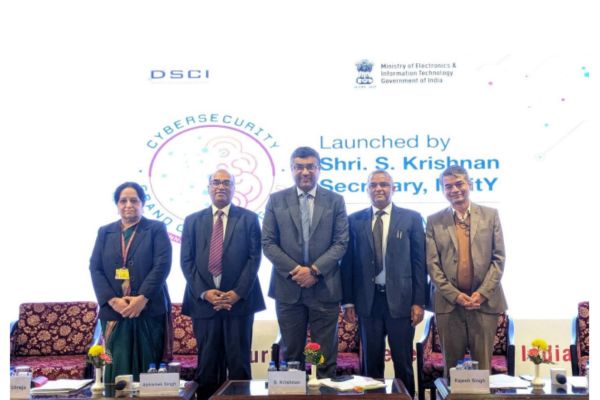The Ministry of Electronics & Information Technology (MeitY) launched the second edition of Cyber Security Grand Challenge, i.e. CSGC 2.0 by Shri S. Krishnan, Secretary, MeitY, which is being implemented by Data Security Council of India (DSCI).
The initiative focuses on strengthening the nation’s cybersecurity competencies and capability building in key areas paving the way for a more secure digital future. Most notably, Cyber Security Grand Challenge boasts a substantial increase in total prize money of INR 6.85 crores from INR 3.2 crores compared to its first edition, making it one of the most attractive and rewarding cybersecurity challenges in the nation.
MeitY invites innovators, startups and budding entrepreneurs to participate in the Grand Challenge. A unique feature, the Intellectual Property Rights (IPR) of the product being developed as part of the challenge will be owned by the respective startup. The whole process of CSGC 2.0 will run under various stages wherein mentorship will be provided at each stage.
Under the Grand Challenge, participants need to create solutions around six defined problem statement areas which include, API Security, Data Security, Wearable Device Security and Privacy, Clone and Fake App Mitigation, AI for Threat Detection and Incident Response, and Securing Next-Generation Biometric Systems.
Cyber Security Grand Challenge 2.0 features an additional stage, the Go-to-Market stage, in addition to three stages namely Idea, Minimum Viable Product (MVP), and Final Product Stage. It expands the scope of recognition by qualifying six startups for each problem statement at the Idea Stage, resulting in a total of 36 startups recognized in the early stage receiving INR 5 lakh each, and 18 startups receiving INR 10 lakh each at the Minimum Viable Product stage.
Throughout the challenge, startups will be provided with technical and business mentorship, helping them mature into successful ventures. At the Final Stage, winners will be declared for each of the 6 problem statements receiving INR 25 lakh each. After the Go-to-Market Stage, which is the final stage of the Grand Challenge, the Platinum Winner will receive a prize of INR 1 crore whereas Gold Winner and Silver Winner will receive INR 50 lakh and INR 25 lakh respectively.
Launching the Grand Challenge 2.0, Shri S. Krishnan, Secretary, MeitY, said, “The Cyber Security Grand Challenge 2.0 is a major government-backed initiative with a significant amount of prize money of INR 6.85 crores and a focus on recognizing startups offering innovative cybersecurity solutions. The problem statements are current and in sync with the latest cybersecurity threat landscape. This initiative will provide mentorship, capability-building and market access, aligning with the goals of Digital India, Atmanirbhar Bharat and Viksit Bharat. I hope the participants and winners will lead change and bring out home grown innovative security solutions to empower India’s digital journey.”
Shri Abhishek Singh, Additional Secretary, MeitY, said, “In today’s digital world, innovation has become essential in securing networks, data, systems globally, and cyber security is now critical for businesses and organizations. We need continuous innovation to combat emerging threats, especially with the advent of new technologies like AI and quantum computing to enhance cyber security capabilities of the nation. We hope that the Cyber Security Grand Challenge 2.0 will serve as a momentum to ideate and innovate cutting-edge solutions to solve emerging problems in cyber security.” Shri Vinayak Godse, CEO, DSCI, said, “We would like to extend our gratitude to MeitY for hosting the Cyber Security Grand Challenge 2.0 and significantly enhancing the scope of the challenge by increasing the prize money to encourage innovation. Various government bodies, PSUs, and industry experts have significantly contributed to identifying the problem statements and providing valuable inputs for the upcoming challenge. We urge industry and government leaders to continue mentoring and supporting startups at various stages of the challenge, building on the impactful guidance provided in the previous edition.”


















